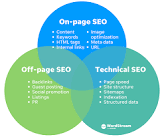
Search Engine Optimization (SEO) is a crucial aspect of any successful digital marketing strategy. When it comes to optimizing your website for search engines, there are two main categories to consider: On-Page SEO and Off-Page SEO.
On-Page SEO refers to the optimization strategies that you implement directly on your website to improve its search engine rankings. This includes optimizing meta tags, headings, content, images, and URLs. By focusing on on-page factors, you can make your website more user-friendly and relevant to search engines.
Key elements of On-Page SEO include:
Off-Page SEO, on the other hand, refers to external factors that can impact your website’s search engine rankings. This includes building backlinks from reputable websites, social media marketing, influencer outreach, and online reputation management. Off-page factors help search engines understand the credibility and authority of your website.
Key elements of Off-Page SEO include:
To achieve optimal results in search engine rankings, it is essential to strike a balance between on-page and off-page SEO strategies. While on-page factors lay the foundation for a well-optimized website, off-page factors help establish credibility and authority in the eyes of search engines.
By implementing a comprehensive SEO strategy that incorporates both on-page and off-page techniques, you can improve your website’s visibility, attract more organic traffic, and ultimately drive conversions.
Contact us today to learn how our expert team can help you enhance your on-page and off-page SEO efforts for maximum impact!
When it comes to off-page SEO, there are four main techniques that play a crucial role in improving a website’s search engine rankings. These techniques include building high-quality backlinks from authoritative websites, engaging in social media marketing to increase brand visibility and reach, leveraging influencer partnerships and collaborations to expand audience reach and credibility, and managing online reviews and reputation to establish trust and authority in the digital landscape. By incorporating these key off-page SEO strategies into your overall marketing efforts, you can enhance your website’s online presence and drive organic traffic for sustainable growth.
Off-page SEO refers to the external optimization efforts that are done outside of your website to improve its search engine rankings and visibility. This includes activities such as building high-quality backlinks from reputable websites, engaging in social media marketing, managing online reviews and reputation, and collaborating with influencers. Off-page SEO helps search engines evaluate the credibility and authority of your website based on factors beyond your site’s content and structure. By focusing on off-page SEO strategies, you can enhance your website’s reputation, increase its online presence, and ultimately drive more organic traffic to your site.
The difference between on-site and off-site SEO lies in the focus of optimization efforts. On-site SEO involves optimizing elements directly on your website, such as content, meta tags, and internal links, to improve search engine rankings and user experience. In contrast, off-site SEO focuses on external factors like backlinks, social media presence, and online reputation management to enhance the credibility and authority of your website in the eyes of search engines. Both on-site and off-site SEO are essential components of a comprehensive digital marketing strategy aimed at boosting visibility, attracting organic traffic, and driving conversions for your business.
The question of whether off-page SEO is better than on-page SEO is a common one in the digital marketing world. Both on-page and off-page SEO are essential components of a comprehensive SEO strategy, each playing a unique role in improving a website’s search engine rankings. While on-page SEO focuses on optimizing elements within the website itself, such as content and meta tags, off-page SEO involves external factors like backlinks and social media presence. In reality, both on-page and off-page SEO work hand in hand to enhance a website’s visibility and credibility in the eyes of search engines. A balanced approach that incorporates both strategies is key to achieving long-term success in improving search engine rankings and driving organic traffic to a website.
On-page SEO refers to the optimization techniques and strategies implemented directly on a website to improve its search engine rankings and visibility. This includes optimizing various elements such as meta tags, content, headings, URLs, and images to make the website more user-friendly and relevant to search engines. By focusing on on-page factors, businesses can enhance their online presence, attract organic traffic, and provide a better user experience for visitors. Effective on-page SEO plays a crucial role in helping websites rank higher in search engine results pages (SERPs) and reach their target audience more effectively.